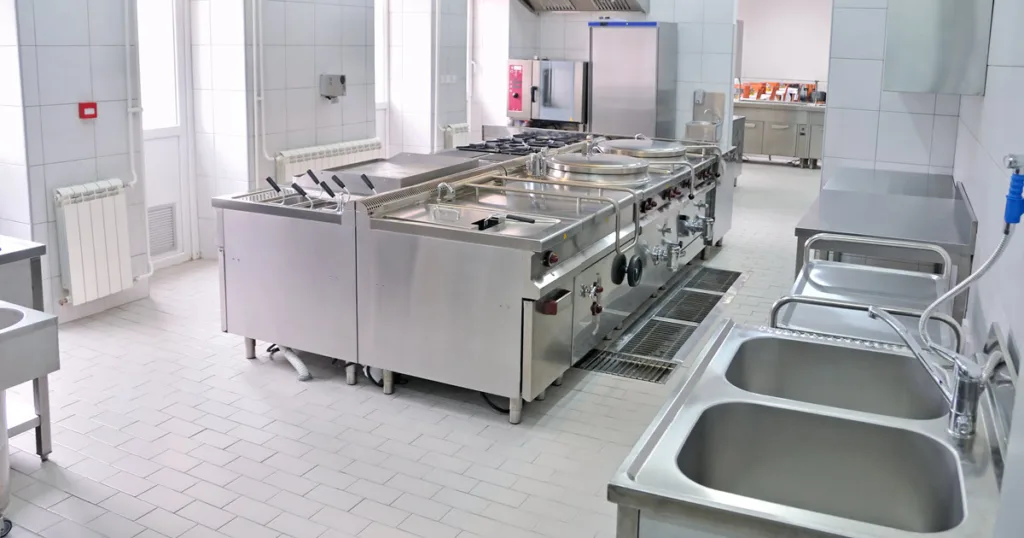Commercial kitchen floors take a lot of beating daily. Aside from enduring heat, spills, drips, breaking glass or plates, and dropped utensils, there’s also the unending scurrying here and there.
Commercial kitchen flooring also needs to have certain qualities that’ll make it safe for all kitchen staff who work in the area and wait staff who come and go.
If you’re currently on the lookout for commercial flooring that’ll hold its own in a big kitchen, below is some essential information that’ll help you make the right choice.
Kitchen Flooring Material Considerations
For a seamless flow of commercial kitchen operations, consider the following factors when looking at various commercial kitchen flooring options:
- Installation, maintenance, and repair: Most types of commercial flooring take time to install initially, whatever the material. However, choosing the most durable material right away can significantly minimise maintenance and repair costs because it won’t be deteriorating anytime soon.
- Durability and longevity: The high-traffic nature of kitchens and the heavy equipment that it houses demands that kitchen flooring can withstand such daily stresses.
- Ease of cleaning and anti-slip qualities: The commercial flooring material you choose must have anti-slip properties to ensure safety, even with fat, oil or grease, and liquids spilled on the floor. It should also enable easy and fast clean-up to ensure health and hygiene standards are met daily.
Durable Commercial Kitchen Flooring Options
There are multiple flooring options for kitchens, but there are very few that are durable enough to perform in demanding commercial kitchen environments. These include resin flooring, ceramic tiles, vinyl and natural stone.
• Resin Commercial Kitchen Flooring
There are different types of resin flooring options. And, depending on the type, they can be easy or difficult to install and repair.
For example, polyurethane (PU) flooring is notoriously difficult to work with, whilst commercial kitchen flooring epoxy takes longer to get cured fully.
Both PU and epoxy typically need to be replaced every five to 10 years since they can get damaged when exposed daily to stresses. Epoxy resin flooring is particularly sensitive to heat, so it isn’t highly suitable for kitchens.
A great alternative to PU and epoxy is ASPART-X – a Polyaspartic material that is made by mixing isocyanate with a synthetic resin, similar to polyurea.
However, the formula used by LINE-X to produce ASPART-X flooring is modified, so it has a less aggressive reaction. It also results in a durable commercial flooring solution that’s resistant to harsh chemicals and waterproof. It’s easy and fast to apply and has a quick cure time.
Read on about Epoxy vs Polyaspartic flooring »
• Ceramic Tile Flooring
Ceramic tile flooring is a popular commercial and residential flooring option. Ceramic tiles are exceptionally tough, and they generally do not attract allergens, dust, and dirt. They also come in a wide range of sizes, colours, and patterns.
However, installing, fixing, or repairing ceramic tiles can be a tiresome, lengthy process as it requires the use of grouts, mortars, and other tools. You also need to hire specialist tiling contractors to ensure the job is properly done. Moreover, since ceramic tiles are very hard and aren’t slip-resistant, you need to have ridges added to them.
You can also experience problems with hygiene when there is grout failure or if the tiles get cracked with severe impacts since various pathogens can proliferate in the grout or cracks.
• Vinyl Kitchen Flooring
Just like tile flooring, vinyl flooring must be installed meticulously as a speck of dirt or any unevenness in the installation can cause damage and lead to the faster deterioration of the material. However, high-quality vinyl flooring that’s properly installed can be extremely durable.
In terms of clean-up, vinyl flooring is generally easy to clean. And although it does not have anti-slip properties, you can get an anti-skid element added to it.
The downside of vinyl flooring is that it cannot at all be repaired, so anytime there’s a rip or tear or a section is damaged, the only solution is to replace the entire flooring.
Additionally, most vinyl floors are prone to discolouration, and when the anti-skid element begins to break down or fail, it cannot be renewed. Any damage to vinyl flooring components would require its total removal and replacement.
• Natural Stone Flooring
In commercial kitchens where aesthetics is a priority, such as in open-kitchen restaurants, natural stone flooring is sometimes used. Stone is beautiful, durable, and hard – qualities that also make it much more expensive than other materials.
Natural stone can be high-maintenance as stone tiles need to be sealed to prevent staining or discolouration. They should also be uniformly smooth and flat to avoid turning into trip hazards. Stone tiles need to be treated with an anti-slip solution to prevent accidental slips and falls due to spilled liquids and oil drips.
Superior Commercial Kitchen Performance with ASPART-X
Based on the information available, it’s quite clear that ASPART-X possesses all the performance requirements in a durable, long-lasting, hygienic, anti-slip, and easy-to-clean commercial kitchen flooring. It has a waterproof membrane and has zero VOCs, so it’s also eco-friendly.
Additionally, it’s easy to apply and cures extremely fast.
And, since ASPART-X bonds to its substrate at a molecular level, it is exceptionally strong and doesn’t require a lot of resurfacing work, painting or spraying. It is designed to put up with all the demands of a commercial kitchen and can put up with high traffic, heavy equipment, the impacts of crashing or dropping tools or utensils, harsh chemicals, and so on.
ASPART-X also looks attractive as it has a similar appearance to flake flooring. Based on the above qualities and more, ASPART-X is the ultimate commercial flooring material for your kitchen.
Contact our LINE-X flooring team today.
